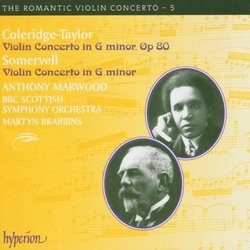| All Artists: Samuel [Composer] Coleridge-Taylor, Arthur Somervell, Martyn Brabbins, Glasgow BBC Scottish Symphony Orchestra Title: Samuel Coleridge-Taylor, Sir Arthur Somervell: Violin Concertos Members Wishing: 0 Total Copies: 0 Label: Hyperion UK Release Date: 3/8/2005 Album Type: Import Genre: Classical Styles: Forms & Genres, Concertos, Symphonies Number of Discs: 1 SwapaCD Credits: 1 UPCs: 034571174204, 034571174204 |
Search - Samuel [Composer] Coleridge-Taylor, Arthur Somervell, Martyn Brabbins :: Samuel Coleridge-Taylor, Sir Arthur Somervell: Violin Concertos
 | Samuel [Composer] Coleridge-Taylor, Arthur Somervell, Martyn Brabbins Samuel Coleridge-Taylor, Sir Arthur Somervell: Violin Concertos Genre: Classical
|
Larger Image |
CD Details |
CD ReviewsTHESE DESERVE TO BE BETTER KNOWN DAVID BRYSON | Glossop Derbyshire England | 03/21/2005 (5 out of 5 stars) "Coleridge-Taylor's violin concerto was almost the last composition of his short life and was first performed shortly before his death in 1912. Somervell's dates from as recently as 1930 although it could almost have been written in 1830. It is given its very first recorded performance here, although the liner-note reminds me that it received that very special accolade an analytical essay by Donald Francis Tovey, which no doubt identifies for us the skilful use of the ritornello, unexpected modulations to the submediant and perhaps even works in the ultimate honour of a perceived resemblance to Beethoven at some point. Both works are very traditional in idiom, but both strike me as showing genuine freshness and spontaneity in their inspiration. Somervell studied under Hubert Parry and taught for a period at the Royal College of Music before finding his true calling as Inspector of Music for the Board of Education, where his distinguished discharge of his duties earned him his knighthood. He looks a rather daunting old buffer from his photograph, but I find his violin concerto very attractive indeed. Its idiom is what is usually and misleadingly called Brahmsian, although I'm sure Somervell himself would have expected and wanted that appellation. To head the finale of one's violin concerto `allegro giocoso' more or less challenges us to think of it otherwise. The melodic quality is genuine, which candidly is more than I can say for most of what I know by Parry himself, and the instrumental writing for both solo and orchestra is high-quality professional stuff. Brahms's own violin concerto strikes me as being greater than all the rest combined, but here is another that recalls the great authentic voice to me while still offering something really worthwhile of its own. Coleridge-Taylor had more obvious individuality, although the liner-note may be right in detecting some influence from Dvorak. If so, the comparison doesn't seem to me to work in one direction only - Coleridge-Taylor's orchestration for one thing is a good deal leaner and cleaner than Dvorak's own. The first movement is to Mendelssohn's simplified scheme, doing away with the big orchestral introduction in the grand manner of Mozart, and probably all the better for that by the year 1912. In both works Anthony Marwood plays like an angel, and if these accounts fail to arouse proper interest from the musical public that will be simply a crying shame. The BBC Scottish SO under Martyn Brabbins may not be the world's leading band, but they acquit themselves very well indeed. I shall be more inclined to make comparisons when I have some performances of these fine pieces to compare from the Berlin Phil, LSO, Chicago SO, Concertgebouw and the rest of them. The recorded quality likewise gives me no grounds of complaint. Enterprises like this deserve support. If you were contemplating obtaining another complete set of Beethoven symphonies, put the money to this and similar good causes instead." Fine concerto by a composer who should be better known Eric Stott | Albany, NY USA | 05/03/2007 (5 out of 5 stars) "The Coleridge-Taylor violin concerto is a fine piece- very uplifting with some particularly exquisite passages in the slow movement."
|

 Track Listings (6) - Disc #1
Track Listings (6) - Disc #1